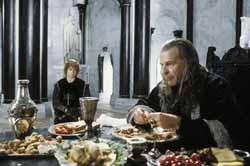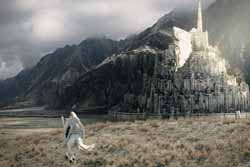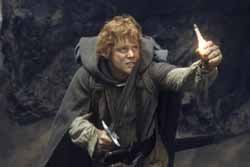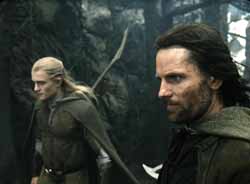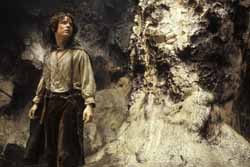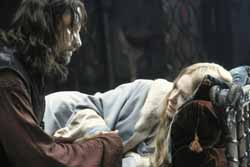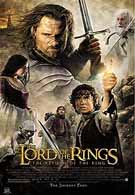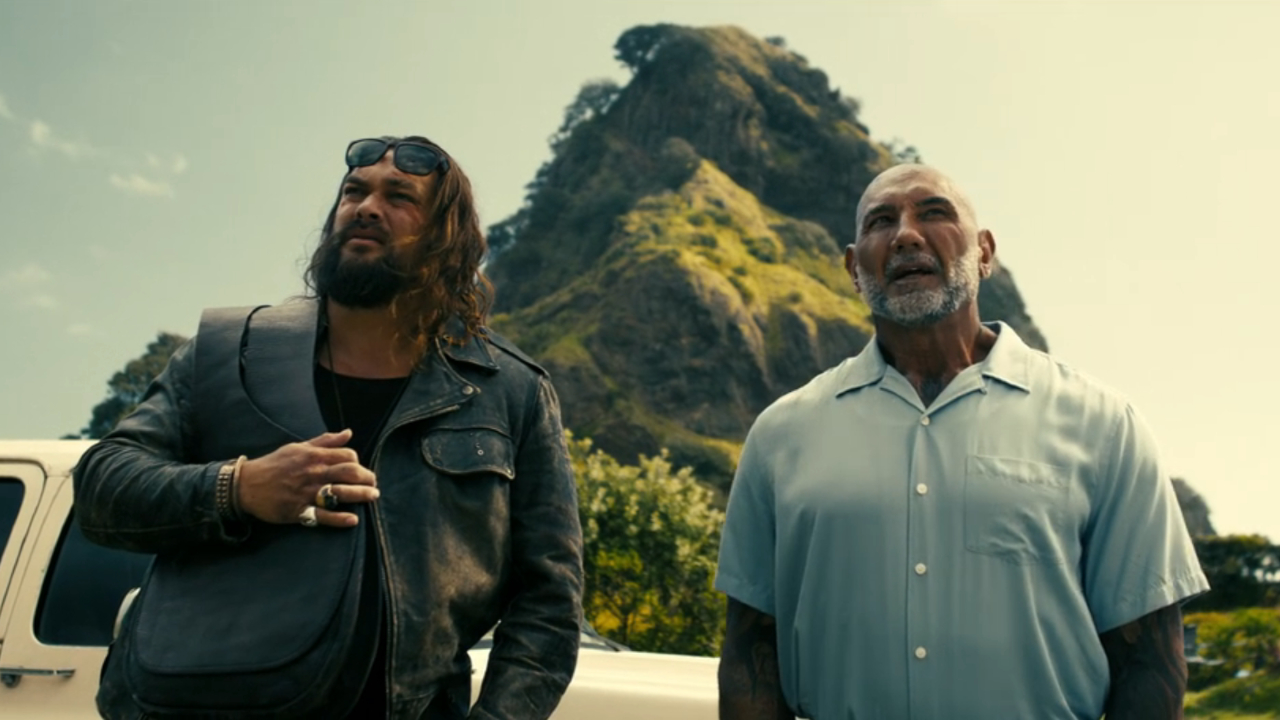Return of the King is one of those "big" movie events that mega fans have been waiting their entire lives to see, while even those who didn't read the books have been waiting at least a couple of years. Oh, and maybe those sad souls who walked out of Fellowship of the Ring a few years ago, wondering why that movie didn't have an ending, will finally pull their heads out of the sand to go see the answer to that question. Return of the King is an ending like no other.
These are the greatest films of our era. Let there be no doubt. Opening with a flashback to the days when Gollum was still Smeagol and first encountered the Ring, ROTK, as did The Two Towers jumps right into the thick of things. If you didn't see the previous movies, so sorry that was your mistake. If you didn't see the other two, or if you did see them and didn't like them, then leave now and never come back. Don't see this one. We don't need you in the movie theater cracking "Frodo is gay" jokes. Is that condescending? Good. This movie is wonderfully long (though frankly it flies by) and I don't need three hours and twenty minutes of your clueless self.
Now that "those people" are out of the room, let's talk about Return of the King. It's a marvel. I don't know how anyone can single out a specific scene which defines it, nor pick any one moment that shines above the rest. Not because it lacks energy or heart, but because every shot is such a completely satisfying piece of drama. More than that, the emotion Jackson manages to bring pouring out of you, as just a random viewer, is phenomenal. You don't realize how hard it is for a filmmaker to elicit the kind of emotional resonance you get with Lord of the Rings until you see something else that attempts it, and falls completely flat. ROTK is by far the most passionate film of the three and that isn't just because of a bunch of sad scenes where characters weep over dead bodies. I found myself getting choked up at the strangest moments. When Theoden stands before the riders of Rohan, rallying his troops for the last stand of men... I cried. Not because they'd lost or won, but because you FEEL what the soldiers in that army are going through. Because you feel the desperation and the suffering and the cold as steel determination emanating from what feels like real people facing certain death. I can't remember any time any movie managed to demand so much emotional investment from its audience and yet paid back such impassioned dividends.
Two Towers split the Fellowship up into groups to accomplish their separate tasks. Return of the King takes that even further, with more tales to tell and more groups to follow. Though, unlike the mildly disappointing work in say, Matrix Revolutions, this story is smart enough to keep main characters constantly involved. There is no big battle scene in which none of the characters from the first film are present. At no point do we follow around Rosie Cotton as she slogs through trenches fighting legions of evil with only her kitchen knife. It might be easy to underestimate how important that is, but Jackson makes it his mission to keep the characters we most care about consistently engaged, no matter how many other new faces must be introduced into the massive cast of his collective masterpiece.
For those keeping score, this is the moment where I tell you who ought to win a truckload of Oscars for their brilliant performance, but probably won't. As Director Peter Jackson has pointed out at least a dozen times by now, the Academy doesn’t shine on fantasy films, no matter how strong a drama this particular one might be. Frankly, every person connected deserves at least two, but these are the performances that warrant them most. First on my list is Miranda Otto. Eowyn's role in Two Towers was that of the tragic stay at home mom. But in Return of the King Otto's character, like so many of the others, at last comes into her own. Otto achieves a kind of subtlety and quiet desperation that was only hinted at in her first appearance. Her part is small in terms of screen time, but her impression is huge.
This is Return of the King though, and Viggo is that king. Throughout all three films, this has been a journey of responsibility for Aragorn as he grows to accept the destiny for which he was born. Viggo is noble, Viggo is powerful, Viggo is resplendent. He's a young Sean Connery but with a grittier style. More than anyone else, this is Aragorn's film.
Ultimately though, it is Sean Astin's performance which is the most gut wrenching. Till now, Sam has just been the fat hobbit who follows Frodo around making really good stew. Well, he's still fat but there's no more rabbit so he gives up the stew and decides to START KICKING ASS. The ring is tearing Frodo up, Gollum is messing with his head, and things are falling apart. It is Sam, not Frodo, who has always been the most hobbity and it is he, who when things get tough starts pushing back. Sam helps Frodo bear his burden and Astin brings out the best in hobbits and in Tolkien's world. His encounter with Shelob will elicit cheers and his desperate struggle to keep up with Gollum's attempts to outwit him and betray them is painful and heartbreaking. For me, Astin's performance in Return of the King embodies everything that is Lord of the Rings. Only the darkest of hearts could watch Sam’s struggle in this film and not ache for him. There’s a unique nobility to his character in his resolute determination to put duty and loyalty above all else. Astin gives one for the ages. Forget Rudy, rarely has there ever been a performance like this.
Your Daily Blend of Entertainment News
In the previous two movies, Billy Boyd’s Pippin, served almost purely as comic relief. It was only towards the end of film two that Pippin really started to grow into someone else. Now he finds himself alone in Gondor at the side of an insane king, watching the world of men slip away. He's torn apart by it. He's absolutely beaten down by what's happening and what he's seen. His guilt over what happened to Boromir has begun to knaw at him and Boyd does an INCREDIBLE job of nearly single-handedly bringing us into the story of Gondor. But turning in one of the most memorable performances of the year wasn’t enough for him, Boyd proves to be one heck of a singer too.
Return of the King is a massive conclusion to an astounding epic of astounding imagery and audacious ambition. It’s a spectacle, an undertaking unlike anything else that has ever touched the silver screen. The funny thing is, what sticks with you isn’t the overwhelming scale of this film, but the little moments of subtlety, of caring, and hope generated by genius direction and obsessively loving detail. The things you remember most aren’t Ohliphaunts trampling hundreds of soldiers or legions of the cursed boiling through the Gondorian hills. The things that make Lord of the Rings and especially Return of the King are Gandalf talking to Pippin about hope, Aragorn striding off to face his destiny, the beacons of Gondor being lit for what feels like it must be the first time in hundreds of years, Theoden coming to grips with the fact that maybe for all of them, this could be the end. Not that the big showpieces aren’t wonderful, but what elevates this, and all three of theses films, so far above everything else is the softness in between.
At one point towards the end of the film, just after we've watched an incredible sequence in which horsed cavalry battles an army of gigantic Ohliphaunts (an eye-popping scene, very much akin to X-Wings buzzing around a Star Destroyer), we see Frodo, standing alone in Mt. Doom, holding the power of the world in his grasp. He stands on the edge of a precipice. In his hand the Ring. Below him is the means to destroy it. He holds ultimate power but at that moment, no creature has ever looked so small. With fire raging around him and the power to change the course of the world, Jackson reminds us how very average and in some ways powerless the people caught up in these grandiose schemes truly are. No matter how big or epic this story has become, Peter Jackson remembers that it is the human elment which drives his story and the little things which make it work.
People have already been complaining about the ending. More probably will. But what seems like multiple stops and starts wrapping up a massive movie is in fact one narrative thread that lets us say goodbye not only to our characters but to what has become Peter Jackson’s story. He doesn’t just leave us with an Ewok like celebration. Winning doesn’t mean happiness for everyone, and for this movie it is every bit as important to let us know that on film as it was for Tolkien on paper.
Abandon all hope and stop bothering with movies if you can't fall in love watching The Lord of the Rings. Twenty years from now we'll still be talking about it, but for now, it’s hard to believe that something which has become such an important part of our cinematic life is ending. Sure, we’ll have the DVD’s and I know I’ll see Return of the King a few more times in the theater, just to really let it sink in. But the story is complete, leaving us, and cinema forever changed for the better.
